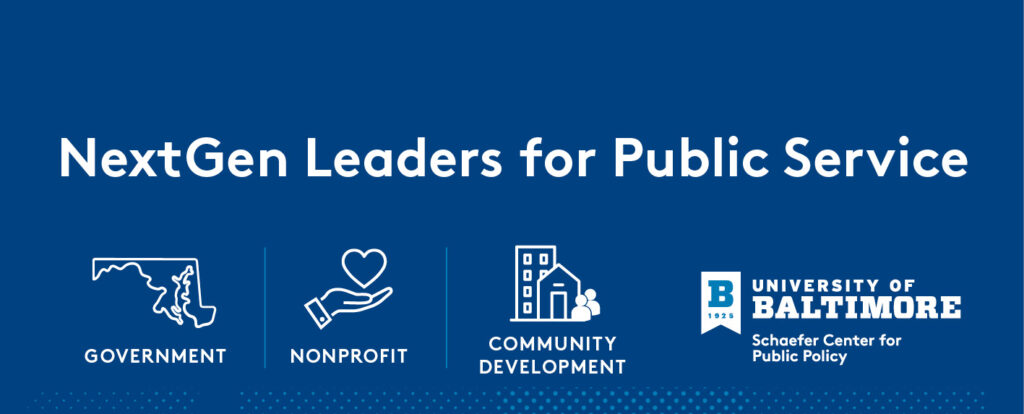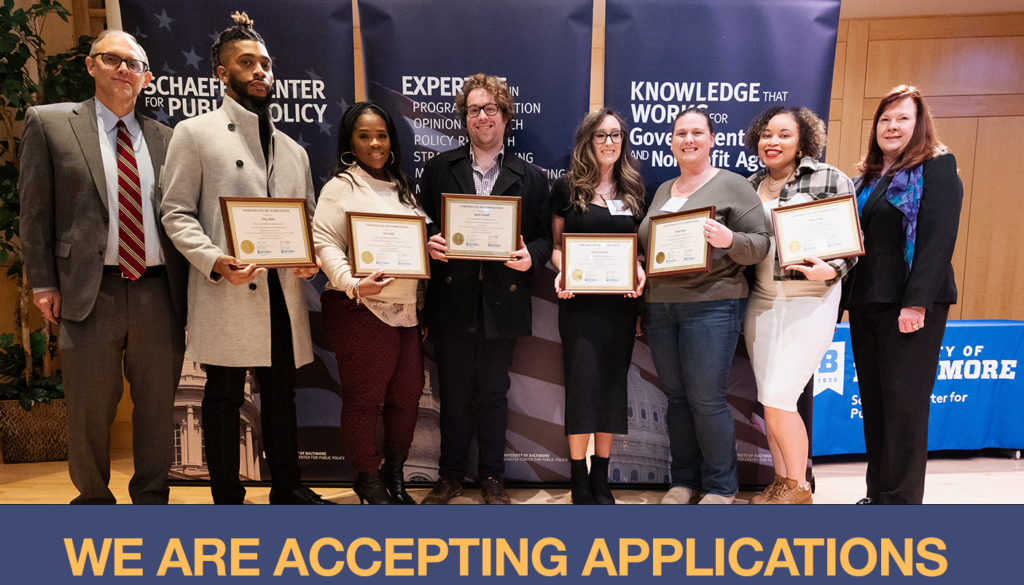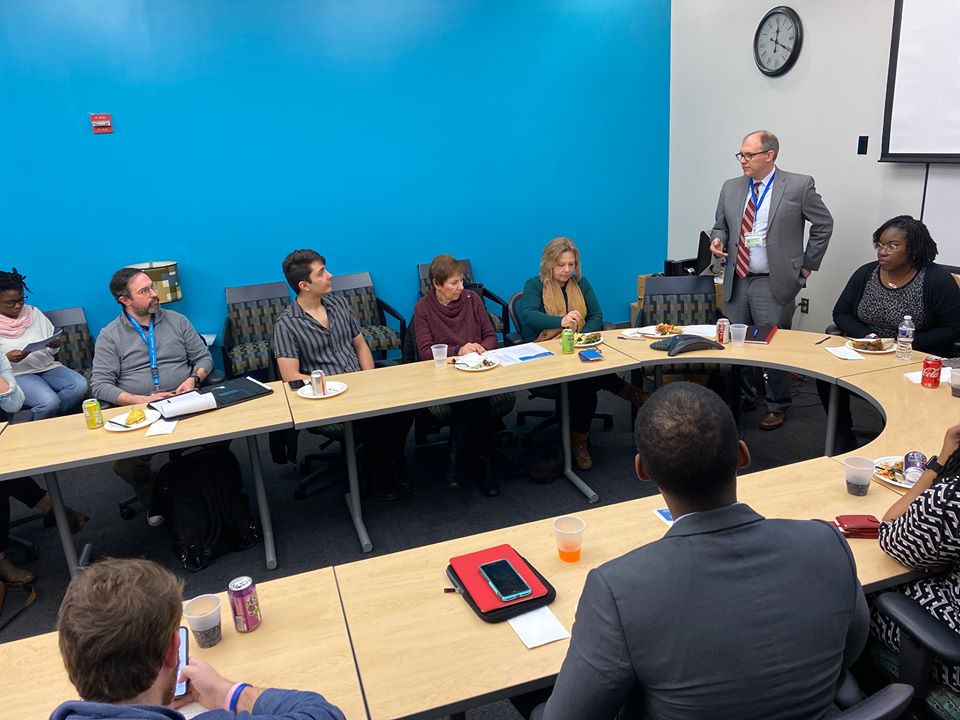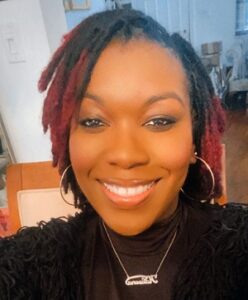Now accepting applications for Community Development Interns and Host Sites for 2025-2026
The Community Development Internship Program—housed in the Schaefer Center for Public Policy—gives dynamic, motivated students who have a strong interest in effecting positive change in urban areas the opportunity to strengthen their leadership skills and gain hands-on development experience. By matching students with organizations that directly support Baltimore neighborhoods, this grant-funded internship program aims to improve the city while cultivating the next generation of community development leaders.
Community Development interns are part of the NextGen Leaders for Public Service, which supports paid internships in government and nonprofit organizations in Maryland. As students explore careers in public service, internship opportunities are available with Maryland government and nonprofit partner host sites. Please see the NextGen Leaders for Public Service catalog for a description of the 17 Baltimore Community Development Host Sites.


How does the program work?
Interns are matched with a community-based organization in the city, such as the Baltimore Main Streets program or a public-private partnership dedicated to economic or community-development work. Specific projects are determined by the host sites based on organizational needs but may include community outreach, special events and other daily work that aligns with interns’ abilities and goals. Interns work anywhere from 10 to 20 hours per week and earn $15.00 per hour. Internships are awarded on a semester basis and are 15 weeks in length.
Upon approval of their academic program director, interns may be able to earn course credit for the semester-long internship.
DONATE
Community Development Internships provide students with the chance to apply what they learn in class to benefit communities. You can help us make a big impact in our neighborhoods and create a new generation of Baltimore community development leaders with your support. . DONATE NOW
How do students qualify for participation?
Eligible students:
- are current juniors, seniors or graduate students in good academic standing (3.0 GPA or better)
- are enrolled at least part-time (6 credits per semester for graduate students and 9 credits per semester for undergraduate students)
- are available to work a minimum of 10 hours per week at the host organization
- have a strong interest in community development and creating positive change in urban areas
- have community development experience and/or knowledge of Baltimore’s neighborhoods
- are able to work independently and take initiative.
Questions
If you have questions or need additional information, please contact the Community Development Interns Program Coordinator at: cdf@ubalt.edu .
Giving back in Baltimore, one fellow at a time
Kaleena Weathers went from learning about grant writing to actually applying for them.
Mohammad Adeel Abbas is putting to practice his lessons on management and communication to help a struggling neighborhood rebuild itself.
Daniel Khoshkepazi is finally getting the community development experience he’s been craving to standout after graduation.
The University of Baltimore’s Community Development Internship Program gives students such as Kaleena, Mohammad and Daniel a chance to turn academic lessons into real-life experiences while making an impact in the city of Baltimore.
Run through the College of Public Affairs, the Community Development Internship Program is open to any UB student that wants to effect change, strengthen their leadership skills and gain hands-on experience.
Students must be current juniors or seniors or graduate students in good academic standing and must provide at least eight hours per week at their host organization.
The program works like a paid internship with funding support from several sources including BGE, Wells Fargo, Whiting-Turner and UB alumni, says Roger Hartley, dean of the College of Public Affairs.
At a kickoff event in February for the newest interns and their partnering groups, Hartley shared his pride of the program that started about three and a half years ago.

“We have incredible students that want to be leaders in their communities and you all needed capacity, needed workers. So I came up with this idea,” he told the group. “This is a program that’s specifically focused on Baltimore, that is rooted to the neighborhoods and is trying to impact those neighborhoods.”
Students have to apply and go through an interview process that helps match the student with a community-based organization in the city, such as the Baltimore Main Streets program or a public-private partnership dedicated to economic or community-development work.
Bringing ‘positive change’
 Mohammad Adeel Abbascame to UB with an extensive resume. He has almost seven years of experience working in the forensics field in Pakistan. He also has two college degrees, a bachelor’s degree in electronics engineering from Pakistan and a master’s degree in electrical engineering from the University of Central Florida, and is working toward another, an MBA, now at UB.
Mohammad Adeel Abbascame to UB with an extensive resume. He has almost seven years of experience working in the forensics field in Pakistan. He also has two college degrees, a bachelor’s degree in electronics engineering from Pakistan and a master’s degree in electrical engineering from the University of Central Florida, and is working toward another, an MBA, now at UB.
When Mohammad applied to be part of UB’s Community Development Internship Program, he was looking to build upon his past experiences in community development. His job in Pakistan gave him a chance to engage with underprivileged populations, ensure their needs were met and justice was served for them.
“The Community Development Internship was a perfect opportunity to utilize my prior professional experience to bring a positive change in the Baltimore areas,” he says.
Through the Internship, Mohammad is working with Waverly Main Street, a non-profit group dedicated to creating a thriving commercial district in the Baltimore neighborhood of Waverly. He was impressed from the start with Matt Smith, the group’s executive director, and quickly became motivated to do what he could to bring some positive change to the area.
Mohammad has been connecting with state and city officials to advance a streetscaping project on Greenmount Avenue, have trees planted and organize an area trash cleanup. He has also helped with efforts to prepare the community for the Census.
Some of his projects were sidelined because of closures related to Covid-19 pandemic, but he has continued to work with Waverly Main Street from home about 15 hours per week.
Even with the unexpected shift to working remotely, Mohammad has been happy to be part of the internship program.
“Coming from a foreign country, Pakistan, this internship provided me the opportunity to engage with different communities of Baltimore,” says Mohammad. “It has provided me the confidence and skills of how to approach people in the U.S. and get their problems addressed. Since I am pursuing an MBA degree which requires high management skills, this internship will go a long way in providing me the necessary skills in management, pressure-handling and communication which hopefully leads to a successful career.”
Meeting a personal mission
 Kaleena Weathers, an MPA student at UB, is working with Sisters Saving the City as part of the Community Development Internship Program. The group aims to empower youth living in the Baltimore’s Park Heights neighborhood.
Kaleena Weathers, an MPA student at UB, is working with Sisters Saving the City as part of the Community Development Internship Program. The group aims to empower youth living in the Baltimore’s Park Heights neighborhood.
Working with the children and staff has been the most fulfilling part of the internship for Kaleena.
“I wanted to work with Sisters Saving the City because they work with children and align with the mission of my own of bettering a community and providing resources for the people of that community,” she says.
The internship opportunity has also helped Kaleena apply what she’s learning in her classes in a practical way. For example, she’s gone from learning about grant writing to actually writing grants that can make a real impact for the group.
“I’m looking forward to SSTC receiving possible funds from a grant I wrote for them,” she says.
She has continued to apply for grants and has started researching fundraising opportunities and working on building a website for the group while working from home.
Not a typical internship
 Daniel Khoshkepazi learned about the Community Development Internship Program from a brochure.
Daniel Khoshkepazi learned about the Community Development Internship Program from a brochure.
Daniel, an M.A. in Global Affairs and Human Security student, was working the front desk for the Rosenberg Center for Student Involvement as part of his graduate student assistantship, when Tiffany Green, the internship coordinator, dropped off the brochures to help with recruitment.
Quotes from a previous fellow, Denisha Hobbs, and Kim Lane, the executive director of Pigtown Main Street that she worked with caught his interest. He wanted to apply, but wasn’t sure if he could find the time between class and his assistantship.
Then the application deadline was extended and Daniel took it as a sign. He applied, expressed interest in working with Pigtown and ultimately got his wish.
“My favorite part so far has been working with my director Kim and my coworker, Frieda [Ulman]. They’re amazing. I feel like I have never been able to build this close and a personal relationship with coworkers who are higher up,” Daniel says. “Since the first day, they’ve done everything they can to include me in every part of the operations that are present in Pigtown Main Street.”
Through the internship, Daniel participates in various committee meetings and gets to offer input when decisions are made for upcoming events, such as offering ideas for giveaways.
It doesn’t feel like a typical internship, he says.
“I 100 percent feel like a staff member. I don’t feel like an ounce less,” Daniel says.
Currently, as he participates in his internship remotely, he is helping with social media outreach and work on Pigtown’s website.
